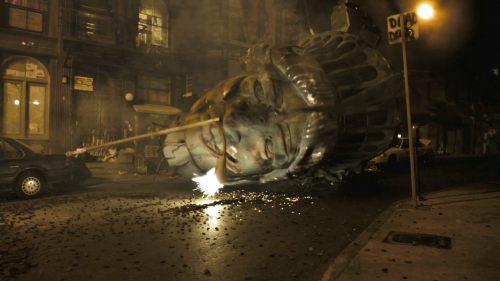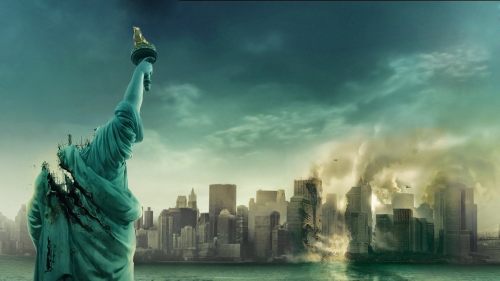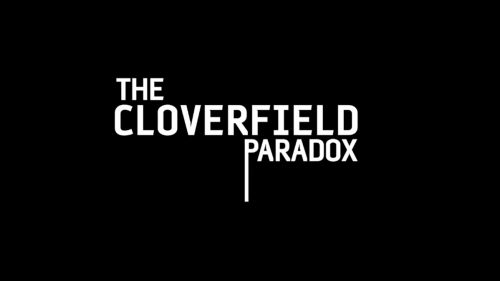THE CLOVERFIELD PARADOX Review: This Movie Was Dumped For A Reason
Let’s get it out of the way: you want to know how this third Cloverfield movie relates to the other two Cloverfield movies, and the answer is maybe it’s a prequel, and maybe it doesn’t have much to do with them at all. Anyone looking for answers from deep within the mystery box will have more luck parsing theories on Reddit.
The Cloverfield Paradox uses the title as a marketing ploy, less a Twilight Zone unifying theory and more a splash of after-the-fact hucksterism that plasters a saleable title onto a mess of a movie.
The concept seemed brilliant when applied to 10 Cloverfield Lane, a terrific film with or without the connective franchise tissue. The Cloverfield Paradox, on the other hand, plasters the title on a movie that doesn’t work in any context. Passed from Paramount to Netflix, and boasting a cast that might make any audience gawk (Gugu Mbatha-Raw, David Oyelowo, and Daniel Brühl, for starters), this episode arrives with surprise fanfare to lure viewers who, if presented a traditional release pattern with a few trailers, would have smelled the stinker coming from miles away.
An energy crisis on Earth sends a team of scientists into space to test and deploy a particle accelerator which might give the planet endless energy. But after two years the crew still hasn’t managed to get the thing working. Tensions rise as the energy crisis worsens down on the surface. This international bunch is beginning to squabble like the crew of the Nostromo. Finally the system seems to work, then it abruptly shuts down. Oh, and where’s Earth?
The “crew ends up far from home” plot is well-worn but not yet threadbare. When The Cloverfield Paradox throws this crew into new space, however, it’s used as a simplistic excuse for a handful of strange non-sequitur setpieces. “Logic doesn’t apply to any of this,” admits Zhang Ziyi’s character as things start to get really weird. Bluntly, this script is an unmitigated disaster, a shambolic collection of borrowed ideas with glimmers of inspiration that rarely get the benefit of follow-through.
Individually, some of these ideas are entertaining as basic concepts, and the first half of The Cloverfield Paradox is the sort of silly hokum that makes for great couch viewing. Exposition tells the story, sidestepping any real engagement between characters. In that void director Julius Onah skillfully works some of the script’s ideas into vignettes. Worms find their way into an unlikely host; a crew member’s arm goes missing; real pulp sci-fi comics material.
The film’s title, by the way, is explained as the possible downside of a successful run with the particle accelerator. Success could unleash monsters on Earth, we’re told, a bald-faced bit of reshoot-enabled franchise-building that is almost admirable in its total lack of guile.
Soon you’ll realize The Cloverfield Paradox slaloms through genres, from horror to comedy to something like hard sci-fi, as a cover for a lack of ideas. This is a procedural that doesn’t actually care about the process of making the particle accelerator work, or why it works, or what it is meant to do. Try to unravel the basic questions posed by the characters who have conflicting ideas about putting the tech to use, and you’ll wonder why they didn’t just talk it all out.
Oh, and why are worms on this space station in the first place, anyway? No wonder this can’t reveal big Cloverfield mysteries; it can’t even sort out its own story.
The saving grace, and the only thing that keeps things moving at any sort of entertaining clip, is the cast. Gugu Mbatha-Raw is magnetic in what may end up being the most thankless lead role of 2018; her character travels through more dimensions in this movie than she actually possesses. No one else gets that much material, but everyone, from to Elizabeth Debicki, as a crew member who shows up late, making a nearly Cronenberg-esque entrance, to Zhang Ziyi’s tough engineer, puts far more effort into their work than the film could ever reward.
The film might be mush because becoming a Cloverfield movie means cutting out concepts and pasting in giant monsters whether or not they have any place in the story. This script, credited to Oren Uziel and Doug Jung, was once The God Particle, presumably inspired by the book that tracks the history of particle physics and the Higgs boson. Precisely which bits were warped out of shape as the film journeyed to become a Cloverfield pseudo-sequel is difficult to discern, but the end result is a failed experiment.



